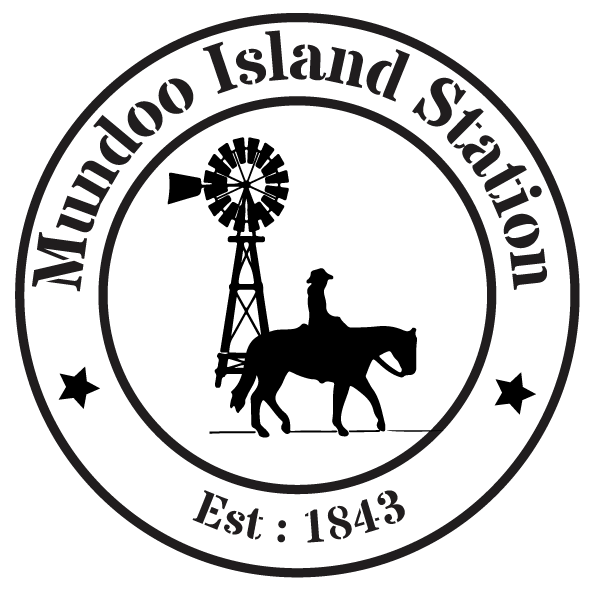History
Mundoo Island Station has a long and unique story in the pastoral and agricultural pursuits of early colonial South Australian life.
Colonial pastoralists in the Lake Alexandrina area had ‘runs’ on which they depastured their sheep and cattle, but did not have any legal claim over the land. They were effectively ‘squatters’. The South Australian Waste Lands Protection Act 1842 provided the Government with the means to issue annual Occupation Licences from 1st January, 1843. The annual licences were required to prevent encroachment, intrusion and trespass upon unsold Crown Land and provided a formal agreement for pastoralists to undertake depasturing on the runs which they had claimed.
McLean Era
Donald McLean, together with his wife Christina and ten children, departed Argylleshire, Scotland on the ship Navarino in December, 1837 bound for Holdfast Bay, South Australia.
Donald McLean subsequently applied for, and was granted, an Occupation Licence from 21st December, 1843. The description of land was not listed, however it can be assumed that the land included Mundoo Island, as his application for the following year stated Mundoo Island as part of the run. Occupation Licence No: 122 for Mundoo and four adjacent islands in Lake Victoria (Lake Alexandrina) was granted on 24th July, 1844. This was renewed annually; however we are unsure for how many years. Our research found the last Occupation Licence recorded for Donald McLean was granted in June, 1847 for the ensuing year. We cannot confirm the year in which tenure for Mundoo Island was relinquished by Donald McLean and taken up by Thomas Holme, as some of the records in State Records were lost many years ago.
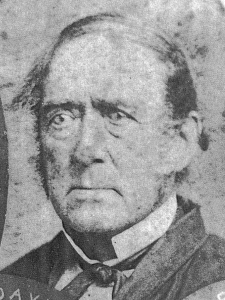
Donald McLean
Holme Era
Thomas Holme applied for Assisted Emigration to Australia on 22nd August, 1838. Thomas, a shepherd (aged 29) and his wife, Mary (aged 23, neé Machel), with their two children (a girl 2 years and a boy 4 months) departed London on 5th December, 1838 and arrived at Holdfast Bay on 22nd March, 1839 aboard the Buckinghamshire after a ninety eight days’ passage.
The children, Isabella Holme (born 1836) and Thomas Holme (born 1838), died soon after arriving in Adelaide. Isabella was buried on the 13th April, 1839 and Thomas was buried on the 25th April, 1839.
Thomas and Mary had more children after settling in South Australia:
- Alicia was born 14th January, 1841
- Thomas was born in January 1843
- James Machel was born 5th September, 1844
- Leonard was born 1st July, 1846
- John was born 18th February, 1849
- William Christopher was born 7th November, 1850
When Thomas registered the birth of his son John, born in 1849, he gave his profession as a shepherd and address as Strathalbyn. It is highly probable that Thomas held an Occupation Licence for Mundoo Island from 1850 as his address was listed as Mundoo Island in 1851. Thomas was quite the pioneer pastoralist, farming sheep in obscure and difficult terrain. He certainly grasped opportunities that many others would not dare to touch.
Pastoral tenure in South Australia remained on an annual licence system until 1851 when an amendment was made to the Waste Lands Act. Occupation Licences were replaced with Pastoral Leases, providing tenure up to 14 years for all land not within Hundreds. We presume Thomas was issued a Pastoral Lease for Mundoo Island at this time.
The improved security of tenure from this amendment to the Act contributed greatly to the more substantial construction of buildings on pastoral runs and stations.
On the 1st July, 1851 Thomas was issued Pastoral Lease No: 60 for land to the south-east of Mundoo Island, namely ‘The Coorong Run’ on Younghusband Peninsula. This lease encompassed the peninsula, 4 miles from the mouth of the River Murray in a south-easterly direction to McGrath’s Flat, a distance of approximately 36 miles. On 4th May, 1858 this Pastoral Lease was endentured [sic] to Thomas Dodd and James Dodd.
Thomas’ wife, Mary, died on Mundoo Island of Consumption on 25th June, 1854 aged 39 years. Thomas was aged 45 when he married his second wife, a Scot, Elizabeth Cameron, at the Free Presbyterian Church, Strathalbyn on 15th May, 1856. They lived on Mundoo Island and had the following children:
- John Garnet was born on 27th April, 1857
- Elisha Margaret was born 3rd February, 1859
- Isabella was born in 1861
- William Christopher (Bob) was born 1st May, 1864
- Duncan was born on 28th August, 1866
- Lachlan was born on 7th December, 1868
A number of parcels of South Australian Crown Land were offered by public auction as freehold Land Grants on 21st February, 1856. Land Agent, Peter D Prankerd, purchased Crown Land Lot 13157, Sec 2346, Mundoo Island, 612 acres, Hundred of Nkangkita. The title for this land was issued in the name of Thomas Holme on 22nd March, 1856. We presume Thomas engaged a land agent to conduct this purchase on his behalf as the title was not at any time in Peter D Prankerd’s name. The first freehold title for Mundoo Island, under the Torrens Title Act, was issued to Thomas Holme, sheep farmer, in 1866 for the consideration of £612.5s.
Life for the Holme family was extraordinarily tough at times. As stated, Thomas’ first wife, Mary, died of Consumption in 1854. Thomas and second wife, Elizabeth, suffered the death of their 3 year old son, John Garnet, from Dropsy on Mundoo Island in April 1861, the drowning death of Thomas and Mary’s 14 year old son, (William) Christopher, in 1863, and the death of Thomas and Elizabeth’s 10 year old daughter, Isabella, to snake bite in 1870.
These tragedies, together with other factors, may have been too much for the Holme family to bear, as five months after the death of their daughter from snake bite, Mundoo Island was offered for sale by auction. The auction date was 18th May, 1871. Listed for sale in the same auction were Thomas Holme’s ‘valuable freehold land at Currency Creek, approximately 1,224 acres and Section 66, Partridge Street, Goolwa with improvements thereon, known as Mr Holme’s property’.
The freehold for Mundoo Island transferred from Thomas Holme to brothers Thomas Dodd and James Dodd on 30th September, 1872.
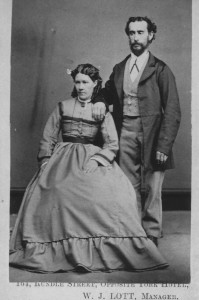
Thomas Holme and 2nd wife, Elizabeth
Dodd Era
James Dodd died on 8th November, 1872, less than six weeks after their purchase, whilst on a boat trip from his home in the Coorong to Goolwa. Thomas Dodd and his wife Mary (neé Harriot) lived on Mundoo Island for many years and raised their family there. Their tenth child, Frank John, was born just over a week before settlement on the purchase of Mundoo Island from Thomas Holme, in September, 1872.
Thomas and James’ brother, Frederick Dodd, was appointed overseer of the two Dodd stations, on the Coorong and Mundoo Island, in 1873 following James’ death. James’ replacement, drowned in the River Murray, hence Frederick’s arrival. Frederick did not stay at this post for long as five of his children were infected with diphtheria in 1873, of which four died.
Thomas Dodd registered a mortgage for Mundoo Island to Joseph Grundy in July 1873. This mortgage was discharged in full in February 1876. Thomas Dodd apparently ran Angora goats on Mundoo Island along with sheep and horses.
Thomas Dodd died on 30th December, 1907; the station was then run by two of his sons, Thomas Andrew and Frank John. Thomas Andrew died a year later, leaving Frank with a life interest in Mundoo Island. The terms of Thomas Dodd Snr’s Will did not allow for his children to sell their interest in the family properties without the consent of all the siblings or until the death of the person with the life interest. The assets, of which Mundoo Island Station was one, were tied up in trusts. This caused Frank major grief as he wished to sell Mundoo Island and purchase a property in Queensland.
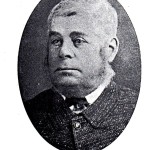
Thomas Dodd
Beckwith Era
Frank sold one undivided moiety (half share) of Mundoo Island to John Beckwith on 26th September, 1917. The Beckwiths were already living on Mundoo Island in the original homestead at this time, whilst the Dodds remained in the second homestead. John Beckwith’s wife, Ellen (Nell) neé Rankine, was a first cousin of Frank’s wife, Jane (Jean) neé Beevor.
Frank and Jean Dodd left Mundoo Island and moved to Melbourne, leaving John and Nell Beckwith to run Mundoo Island Station. Frank later moved to Queensland in August 1922 where he became involved in a number of business opportunities including working on Calliope Station growing cotton and later farming cattle. Jean and Margaret stayed in Melbourne until Frank was settled, and then moved to Queensland.
John sold his ‘half share’ of Mundoo Island to Walter Grundy on 9th February, 1922. The Beckwiths moved to Upper Sturt, growing fruit and berries, until John’s health forced them to move to the city. They bought a house in Goodwood Park where Nell died in 1945, aged 72. John spent years in a wheelchair and then bed-ridden in St Andrews Hospital. He died in 1952, aged 86.
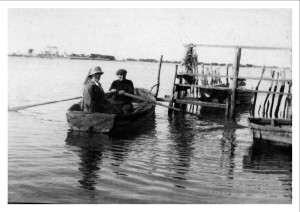
John and Nell at Mundoo c1920
Grundy Era
Walter Grundy wished to purchase Frank Dodd’s interest in Mundoo Island so that he had full and clear title to the property.
On 1st July, 1932 settlement was reached with Frank Dodd and he transferred his ‘half’ share of Mundoo Island and associated leases to Walter’s son Jack Grundy. This enabled Frank to purchase the property he desired in Queensland and enabled Walter and Jack Grundy to farm Mundoo Island with absolute confidence that they owned the property in its entirety and Frank would not appear on their doorstep wishing to move in and farm his ‘half’.
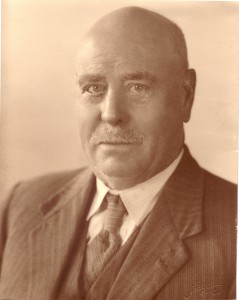
Walter Grundy
